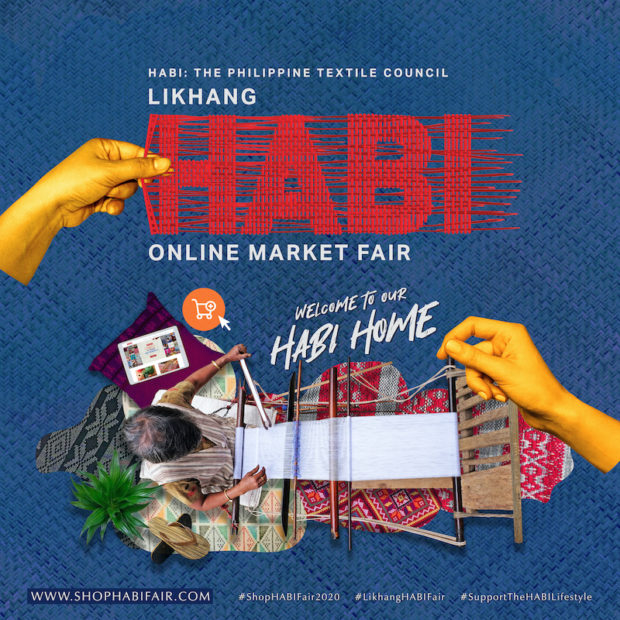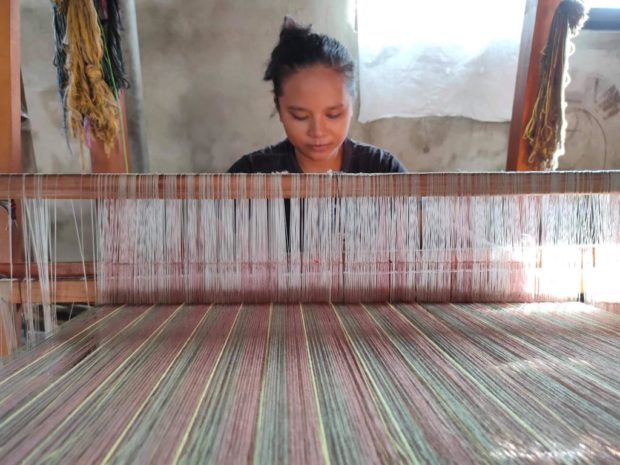
Habi: The Philippine Textile Council launched its first virtual Likhang Habi Market Fair, a pioneer in artisan fairs since 2009, in line with their advocacy for the local weaving community, today, Oct. 21.
In the past, the annual fair used to be held at the Glorietta Activity Center in Makati City which has been a lively marketplace for weavers and artisans, and usually highlighted the handloom weaving industry. Activities included craft demonstrations, dances and other performances.
Along with the month-long festivity of the National Indigenous Peoples’ Month, this year’s online fair is driven by Habi’s advocacy to preserve and promote the local textile industry. It also aims to provide platforms for the local weavers in the country, and give them continuous support amid the coronavirus pandemic.

Image: courtesy of Likhang HABI Market Fair
According to Habi council president Adelaida Lim, despite the difficulties market weavers have been facing due to the pandemic, the local weavers’ response was still impressive; they decided to level up their works with new techniques, which is what encouraged the council to come up with the market fair.
“Since we are not allowed to gather in large groups because of the pandemic, the online edition of the Likhang Habi Market Fair is our way of helping to sustain the local weaving economy,” Lim said during a virtual media launch last Oct. 8.
Lim also urges their Habi friends to sustain the economy by purchasing online, as shoppers would have the option to acquire beautiful things that speak of “identity and traditions.”
Different sustainable and ethical fashion and lifestyle products from over 30 merchants representing various weaving communities from Luzon, Visayas, and Mindanao are showcased in the trade fair.
A transition to the ‘new normal’
Over the years, Habi has been empowering traditional and local weaving communities by providing them with platforms to further enhance their skills in creative designing and modern marketing, through the exchange of ideas with consumers, traders and other designers. The Likhang Habi Market Fair would also allow them to innovate and level up into modern trends.
“There are many beautiful fabrics from the different areas in our country. One of our main goals at Habi is to make sure that our traditional textiles will still be a part of our modern lifestyle as we transition to the new normal,” says Habi chairperson Maribel Ongpin.
Inaul Reversible Poncho Karanda by The Manila Collectible Co. Image: courtesy of Likhang HABI Market Fair
Moreover, Habi strives to sustain its long-term commitment and advocacy of reviving the use of pure Philippine cotton in making fabrics, a fiber that is considered very much a part of the Filipino culture.
During the virtual media launch, Philippine cotton advocate Mike Claparols of Interweave shared that the biggest problems the weavers have been facing since the onset of the pandemic are logistics, cancellation of orders including those from institutional buyers and shops, as well as effects on tourism.
Face mask and face shield with pouch by TADECO Home. Photo courtesy: Likhang HABI Market Fair
“These [problems] led to several effects. One of them is that many communities had an overstock of fabrics, which is the main issue right now. For several of them, part of their mitigation activities was to make face masks [which is] a very good idea as the demand [for it] is still going on right now,” Claparols added.
Habi has also partnered with the Philippine Fiber Industry Development Authority (PHILFIDA) to give local farmers cotton seeds and threads for its cotton adoption project, to encourage more weavers to use pure cotton in their products.
Ifugao Cotton Binodbodan Poncho by The Manila Collectible Co. Image: courtesy of Likhang HABI Market Fair
Promoting Filipino culture and heritage
Apart from the virtual market fair, Habi also prepared a series of webinars and a four-day online summit called “Mga Hibla ng Pamana: A Summit on Weaving as Intangible Cultural Heritage,” in partnership with the Nayong Pilipino Foundation, congruent with their mission to promote the Filipino culture and heritage.
The summit speakers will discuss how different sectors in the country are coming together to protect and conserve traditional weaving practices, and encourage commercial business enterprises to begin evaluating their methods in relation to the protection of intangible cultural heritage. This is seen as fundamental in sustaining cultural diversity in the face of globalization.
In collaboration with CulturAid, Kularts, House of Gongs and Museo ng Muntinlupa, Habi will be presenting the first-ever international voices from the field program, featuring a series of webinars intended to bridge interdisciplinary voices and encourage dialogue; this, to better understand how our diverse experiences as Filipinos have shaped us.
Aside from webinars, the latest work of Philippine textile experts Dr. Norma Respicio and Gayle Zialcita titled “Weaving Ways: Filipino Styles and Techniques,” will also be available at the online fair. The book explores thoroughly the different weaving communities in the Philippines, their history and traditions, and the different weaving styles and techniques of Filipino weavers.
Piña Weaving Competition
The annual Likhang HABI Market Fair will also highlight the Lourdes Montinola Piña Weaving Competition which is now on its third year. Here, the exceptional craftsmanship and mastery on the delicate process of turning pineapple threads into works of art will be recognized.
“The competition has encouraged us greatly over the years because it brings out new talent and has brought about the revival of forgotten weaving techniques. Innovations have been introduced and young talents can develop, so we always look forward to the surprises that this competition will bring,” says Lim.
Piña Silk Barong by La Herminia. Photo courtesy: Likhang HABI Market Fair
It has been opened on Oct. 15 to interested participants, particularly Filipino artisans who weave, dye, embroider or embellish piña. Entries submitted by participants will be exhibited and judged by Filipino fashion designers Leslie Mobo and Len Cabili, and piña textile expert and food historian Felice Sta. Maria.
Likhang Habi Market Fair will be available online from Oct. 21 to 27 at www.shophabifair.com. For more information on the series of webinars and Habi’s advocacies, visit www.habitextilecouncil.ph or follow the Habi: The Philippine Textile Council on Facebook and Instagram. JB
RELATED STORIES:
Cebu designers rising to pandemic’s challenge
9-year-old boy from QC weaves, sells rugs to earn money for buying e-learning gadget
Siargao resto’s woven pizza boxes: Eco-friendly livelihood for Tangbo weavers

